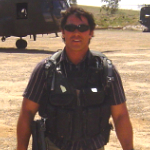
AUCKLAND SPEAKER PRESENTATIONS

A welcome from our chair
Scott Taylor
Managing Director, Praesidium Risk and Resilience
“Having seen the growth and flow on impact from the Retail Risk Events in numerous States and Countries, I am honoured to play a small part in the commencement of Retail Risk New Zealand. I’m looking forward to learning from some stellar thought leaders in the wonderful Marina location”.
We are delighted that Scott is Chairing Retail Risk – Auckland this year. An accomplished Conference Chair, he is the current Regional Vice President of ASIS International and is a 29-year tenured security and risk professional.
Through his firm Praesidium Risk and Resilience, he provides nuanced asset protection and risk mitigation consultancy as well as contextualised training services to a diverse client base through the retail, entertainment, and hospitality sectors both domestically and abroad. He has been a repeat presenter at Retail Risk events nationally and in Dubai and has had numerous appearances on the Retail Risk Podcast.
Scott is an innovative and performance-driven leader who has worked across the gamut of the security and risk industry and we are confident his appointment as Conference Chair is of no surprise to those who have heard his passionate presentations on the protection of staff in the Retail Sector from escalating situations of aggression and violence.
Hamish Whistler
Loss Prevention Manager
Bunnings New Zealand

How can we use technology to fight retail crime?
Using advanced technology to detect, prevent and investigate fraud and crime in NZ retailers
This round table discussion is for retailers to share what technology is helping them the most to combat crime in their businesses. It is an opportunity to potentially discover new advanced approaches that will reduce crime in your communities and stores.
Hamish Whistler
Hamish has worked for Bunnings for 19 years and is currently the Loss Prevention Manager for the New Zealand division. Throughout his career, he has worked in leadership roles in Store Operations, eBusiness and Loss Prevention in both Australia and New Zealand. He is a trained Data Analyst and qualified as an Organisational Psychologist at the University of Waikato (Master of Applied Psychology).
In his Loss Prevention roles, Hamish has focused on developing analytics approaches to better identify high risk locations that require coaching and support from the Loss Prevention Adviser team. Additionally, he has worked closely with internal business functions and external solutions providers to highlight stock loss challenges, find solutions, build consensus, and facilitate the rollout of new processes or product protection solutions.
Hamish lives in the Waikato with his wife and three children. He is an active volunteer firefighter and safety advocate for Fire and Emergency New Zealand.
Paul Bessant
Founder, Retail Knowledge & Global Top 100 Retail Influencer

A new model of Loss Prevention that offers huge gains for New Zealand retail
Twenty years in the making, this global loss prevention model offers the potential to slash shrink to 0.07% in NZ
Retail Risk Founder, Paul Bessant, has not only lived through one of the most important eras in retail’s fight against crime, but he has also been instrumental in helping to shape it.
In his presentation Paul offers a blueprint for New Zealand retailers to transform their loss prevention operations; challenging them to adopt strategies that have shown themselves invaluable around the world in fighting crime and reducing retail loss.
The presentation considers:
- Has Loss Prevention really changed in the last 20 years in terms of personnel and technology?
- What is the true impact of omni-channel retail for criminal gangs?
- How is it possible that a profitable UK fashion label could go bankrupt solely because of high shrink?
- How does the “backroom work” of the Loss Prevention department impact your brand… the latest data?
- How are fierce competitors working together to fight ORC in all its forms?
- Why is it no longer possible for individual retailers to fight crime on their own?
How to convince retail leaders to invest in Loss Prevention and create board positions for the leading exponents
This presentation offers the lessons gleaned over 20 years of collaboration with those at the very top of retail around the world. The material covered should have a profound effect on all those fortunate enough to see it.
Matthew Tierney
Manager
National Retail Investigation Support Unit (NRISU)
An update on the work of the NRISU
Join Matthew for the latest insights on the NRISU’s work with Retail
The New Zealand Police’s National Retail Investigation Support Unit targets the most violent and recidivist retail theft offenders. As Manager of the Unit, Matthew works very closely with the retail sector to reduce harm from crime, and he looks forward to new partnerships with this goal in mind. Before joining the NRISU Matthew was a police officer for 16 years and left in early 2020. In early 2022 he was reemployed by the police to establish this new unit.
Daren Ng
VP & General Manager Asia Pacific
Sensormatic Solutions

Retail trends and shopper insights 2024/5
A briefing on the latest trends and insights for Retail
Daren will deliver a briefing for retailers, also considering:
- What you can do about the retail and shopper trends
- What retail data do you have, and are you looking for to better manage your operations?
- A guide to better retail operations/data management.
Following his presentation Daren will host a round table for more in-depth discussion of these trends and insights.
Mike Jennings
Head of UK Sales and Channel Partner Manager for ANZ
Reveal Media
Rachel Donald
General Manager
Cert Group

Mike Jennings

Rachel Donald
De-escalation skills for retail staff
Ensure you are doing everything you can to keep your staff safe
In a society where retail staff are encountering challenging behaviour and increasingly, aggression, abuse, and even aggravated robbery, it is essential that staff are equipped with the skills and technology to keep them safe.
CERT Systems
CERT Systems Limited is the leading provider of Situational Safety and Tactical Communications training in New Zealand, giving those that work in front line roles across a wide range of sectors the skills to stay safe – physically and emotionally – when dealing with difficult customers. These skills are focussed on risk awareness, techniques to resolve a situation and skills to de-escalate any situation if the threat evolves. They also provide robbery and lockdown training and resilience and well-being training, tailored specifically to an organisation’s needs.
This training, coupled with the use of world-leading technology provided by Reveal Body Worn Cameras, gives organisations peace of mind they are doing all they can to keep their staff safe.
Join our roundtable to learn some quick and effective tactical communications techniques to deal with difficult people and an update on the benefits of body worn camera technology to de-escalate challenging situations.
Mike Jennings
Mike is the current Head of UK Sales and the Channel Partner Manager for ANZ for Reveal Media. Mike has been at Reveal for over four years, and currently works alongside Cert as an in-country partner to provide body-worn video in New Zealand. Reveal introduced body cameras into UK Retail in 2018 and have been leading its adoption ever since with clients seeing benefits across the globe.
Graeme Stanley
National Technology Manager
CSE Crosscom

Keeping staff safe – and customers happy!
How do you maintain a positive customer experience while implementing technology-based safety measures for retail associates?
Increasing theft, safety incidents, threats to personal safety, new regulations, changing community expectations, additional workplace obligations… We operate in a complex, multi-dimensional environment.
Various measures can impact how safe retail associates feel at work. The two highest impact measures as rated by 1000 retail associates being technology: security cameras (69%) and alarm systems (44%). Other technical solutions including communications like two-way radio, merchandise sensors, mobile safety apps and lock control systems, all included in the top 10 measures.
When an issue arises or emergency strikes, every second counts. Leveraging modern communication and technology channels, can go a long way in connecting in-store employees, security personnel, corporate retail entities and emergency services.
In this round table discussion Graeme will focus on how to manage the introduction of technology, including:
- How to identify technology as an enabler
- The importance of an integrated experience
- Considerations for how to deliver improved Customer experiences when implementing safety measures
- Implementing solutions that solve issues – not just create additional work
- The management of solutions across multiple locations.
He will touch on solutions such as:
- Two-way radios
- Licence plate recognition
- Body-worn cameras
- Video security systems and analytics
- Panic buttons / personal alarms.
Graeme Stanley is a Technical Director and Business Leader with 20+ years consistent success in IT and Telecommunications developing ground-breaking technical strategies to execute large-scale $10m+ public safety and emergency service solutions. He drives positive customer partnerships, engagement across business units and sound business understanding in a mission-critical public safety environment.
Simon Herron
CEO
Vix Vizion

Facial Recognition and us
How does it work, and what does it mean for New Zealand retailers?
Facial Recognition promises huge advances for retailers in their fight against crime and loss. There is no other technology which can provide real time alerts if a repeat offenders return to a store with such speed and accuracy.
The technology provides unparallelled opportunities to reduce theft, protect staff from assault and apprehend repeat offenders. It affords all stakeholders unprecedented levels of security and protection. And yet, there is uncertainty around its use…
Simon Herron is the CEO of Vix Vizion, the Number 1 facial recognition company in Australia and New Zealand and a leading expert in the use of Facial Recognition and Video Analytics in the Retail industry.
In this presentation Simon will provide an overview of the current problems in New Zealand retail, which Facial Recognition can help address.
- He will summarise where Facial Recognition is at in NZ Retail and where we think the NZ Privacy
- Commissioner investigation has progressed to.
- He will outline other mainstream uses of Facial Recognition in other industries.
- Specifically, he will cover how facial recognition works in the retail space and what are the benefits and challenges.
The potential benefits of face recognition and competitive advantages that it offers, by enhancing the customer retail experience (perhaps in ways that you might not yet have realised), are too big not to prepare for right now.
This presentation and ensuing roundtable will ensure that, when the Privacy Commissioner does finally report, you will be properly prepared. It will enable you to make well-informed management decisions to get the most out of the technology, as it is relevant and appropriate for your business.
Raymond Nie
Project Sales Manager, NZ
Dahua Technology

Creating a robust risk management ecosystem in Retail
Join Raymond for a discussion on building collaborative partnerships in Retail Security
Considering the benefits of forming strong alliances with security experts, technology providers, and fellow retailers to create a robust risk management ecosystem.
Chris Kumeroa
Managing Director
Global Risk Consulting Group

Protect your NZ business from security-related risks and incidents
NZ-based global risk specialist Chris looks at the risks and how you can improve your business’s response to them
Building a comprehensive intelligence picture will identify risks at a national / regional / local level. Having identified the risks, Chris considers how they can be negated through stakeholder understanding of critical roles in reducing risk and the use of security design aspects, physical security measures (assets), procedural application (including response plans) in retail stores. He will look to cover a) modifying the likelihood of becoming a target and b) modifying the impact:
- Modifying the likelihood of becoming a target for incidences is understanding the strategic and operational risk context through detail risk assessments (building the intelligence picture – who is a target and why) and deploying assets that improve hard targeting and reducing likelihood.
- Modifying the impact is the incident and emergency management process. Having a comprehensive incident management plan is ensuring that all stakeholders understand their role (including private security, physical security assets, CCTV and monitoring, police and their response to retail threats, ie life threatening versus non-life threatening).This is an unmissable session for everyone interested in protecting their NZ business from security related risks and incidents.
About Chris
Chris provides advice and support to the Department of the Prime Minister and Cabinet (and 16 other Agencies) on national security matters aligned with the Royal Commission of Inquiry to the Christchurch Attack – March 2015. Current focus areas are: National Critical Infrastructure, Economic Security, Cyber, Terrorism and Violent Extremism, Intelligence and Security Act, National Security Strategy, National Security System, Rec-12, Foreign Interference and Firearms and Safety.
He currently Chairs the Crowded Places-Security Group and liaises with stakeholders across a range of complex issues that relate to best practice, systems design and implementation for the Crowded Places Strategy.
Chris spent a number of years in the Military with a primary focus on Counter Terrorism, Human Tracking, Intelligence gathering (deep-reconnaissance) and Mountaineering and was part of the NZSAS, Special Forces Mountain Troop and Counter Terrorist Team (CTT).
He has been actively involved with large multi-nationals and foreign states in the Middle East, Africa and Asia. His work has assisted the United Nations, ABB, Orascom, Royal Families, Americas Cup, NBC-Universal, APEC, Chinese National Petroleum Company (CNPC), Marathon Oil, Whorley Parsons, foreign diplomatic personnel, and the Country Security Risk Manager, Schlumberger in Pakistan, liaising directly with state agencies and other major oil and gas providers within the MEA region.
Mark Knoff-Thomas
Chief Executive
Newmarket Business Association

Reducing retail offending – the Newmarket perspective
Newmarket has an innovative approach to addressing offending and anti-social behaviour, particularly by youth
Join Mark for an unmissable presentation on the measures employed successfully by Newmarket town centre to reduce crime, with a particular focus on youth. He will provide an overview of the retail crime situation in Newmarket, the steps the Newmarket Business Association has taken to address it – including a very effective partnership between their security provider and local Police – and the results achieved.
Mark Knoff-Thomas has been CEO of the Newmarket Business Association for almost 10 years. The Association’s main focus is the promotion and economic development of the Newmarket precinct. Mark acts as chief advocate for Newmarket in media and with local and central government. Last year he launched NEWMARKET SECURITY, a new town centre security model that, along with utilising the latest in CCTV and technology tools, is fully integrated and connected with the local Police.
Prior to working at the Association, Mark had an extensive career in recruitment where he helped develop a start-up, worked in Executive Contracting for an SME, then went onto Executive leadership roles with a Fortune 500 US multi-national. He has over 20 years director level, and general management experience leading diverse teams, revenue streams and in multiple cities. His background also includes international education and a stint hosting overnight talkback on Newstalk ZB back in the late 90’s.
Jackson Calder
Geopolitical analyst and Risk Consultant
Global Risk Consulting Group

Using intelligence to drive better security outcomes
Join Jackson for a discussion on how you can use intelligence within retail security
Jackson will host a roundtable to discuss:
- How/why we collect and analyse intel
- What intel? For example, crime data and visualisation (like SITREP reports), ideological, incivility & extremist influence (mis/disinformation shaping people’s motives?)
- How to apply intel
- Qualitative aspects: what are the wider social, economic, political drivers of risks
- International element: eg the ideological “import” of brazen looting from the US; psychological/relational aspects between producer and consumer; how do people seeretailers during hard economic times?
Jackson Calder
Jackson is a Geopolitical Analyst and Risk Consultant with Global Risk Consulting (GRC) Group. He holds a Masters of Strategic Studies (MSS) from Victoria University of Wellington and specialises in risk and threat assessments of foreign interference, terrorism and violent extremism, incivility, social unrest, and crime. He is also a Board Member of RiskNZ, the leading non-profit association of risk professionals in New Zealand.
Jackson writes GRC Group’s quarterly SecIntel Security Situation Reports (SITREP) covering violent crime, other crime, cyber incidents, and incivility. He has a deep understanding of the risk landscape in New Zealand, the Macro Risk Drivers influencing different security situations, and has experience gathering and applying intel to understand complex problems.
Charbel Massoud
ANZ Account Manager
Gatekeeper Systems
Chris Barwick
ANZ Technical Projects Manager
Gatekeeper Systems
Trolley push outs and the Impact on retail in New Zealand
Exploring the surprising facts around this rising threat to retail
In recent years Gatekeeper Systems has been focusing on the generally unseen rise in trolley related push out theft and the increase in violence and risk to retail employees and customers. What has been “Under the Radar” is now becoming a significant problem for all facets of New Zealand retail, given the free access to shopping trolleys, cost of living crisis, increasing drug induced aggression and heightened focus on employee safety.
Charbel and Chris will ask some pertinent questions to the group and discuss the experiences so far in New Zealand commenting on identified methodologies used by opportunist and ORC thieves to remove trolleys full of groceries. They will answer some of the most frequently asked questions and respond to myths surrounding this line of theft activity. The human demographic of such theft events will surprise many as will the amount of activity that goes undetected and the varied value of pushed out merchandise.
Scott Taylor
Managing Director
Praesidium Risk and Resilience

The non-verbals utilised by those with bad intent
How to recognise body language of people intending theft, anti-social crime or violence
Aside from his 29 years in security and risk, Scott has spent the last 6 years training with the world’s foremost experts on nonverbal communication (body language, facial micro-expressions etc) and also word analysis. In this session, he will share his knowledge on the physiological changes that can be seen when people attend the retail space with bad intent. Whether it be theft, anti-social crime or violence, the brain knows what it knows, and Scott will teach you some of the signs your teams can pick up that can translate into them being better positioned to navigate the nuances of the situation.
Alistair Bulmer
Manager of Loss Prevention & Safety AUS/NZ
EB Games Australia
Basil Salah
Riskified

How can retailers improve their strategies for managing fraud?
An interview with Alistair Bulmer about the approaches that are working at EB Games
When it comes to devising strategies for managing fraud, many merchants find themselves grappling with outdated approaches that result in false declines and lost potential. Startlingly, Riskifed’s internal data reveals that a staggering 66% of orders declined by merchants are, in fact, legitimate. Join Alistair and Basil for a discussion around the use of behavioural analytics, which offer an effective means of determining order legitimacy.

Contact us
Retail Knowledge Services DMCC
AG Tower
Jumeirah Lakes Towers
Dubai
UAE
Telephone
London: +44 (0) 207 100 3 999
Sydney: +61 (0) 2 8310 5744
New York: +1 646 396 0450
Email: [email protected]
© Retail Knowledge 2023
Our conferences
Retail Risk – Sydney
Retail Risk – London
Retail Risk – Melbourne
Retail Risk – Cape Town
Retail Risk – Leicester
The trademarks Retail Risk, Gala Dinner and the Fraud Awards are owned and licensed for use by Really Effective Marketing Ltd. All rights reserved.
















